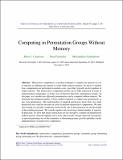Files in this item
Computing in permutation groups without memory
Item metadata
| dc.contributor.author | Cameron, Peter Jephson | |
| dc.contributor.author | Fairbairn, Ben | |
| dc.contributor.author | Gadouleau, Maximilien | |
| dc.date.accessioned | 2014-11-11T12:31:01Z | |
| dc.date.available | 2014-11-11T12:31:01Z | |
| dc.date.issued | 2014-11-02 | |
| dc.identifier.citation | Cameron , P J , Fairbairn , B & Gadouleau , M 2014 , ' Computing in permutation groups without memory ' , Chicago Journal of Theoretical Computer science , vol. 2014 , 7 . https://doi.org/10.4086/cjtcs.2014.007 | en |
| dc.identifier.issn | 1073-0486 | |
| dc.identifier.other | PURE: 156946830 | |
| dc.identifier.other | PURE UUID: 71e2cfd6-3d30-411e-bfb6-aee1f5f6ab40 | |
| dc.identifier.other | ORCID: /0000-0003-3130-9505/work/58055548 | |
| dc.identifier.uri | https://hdl.handle.net/10023/5727 | |
| dc.description | Funding: UK Engineering and Physical Sciences Research Council (EP/K033956/1) | en |
| dc.description.abstract | Memoryless computation is a new technique to compute any function of a set of registers by updating one register at a time while using no memory. Its aim is to emulate how computations are performed in modern cores, since they typically involve updates of single registers. The memoryless computation model can be fully expressed in terms of transformation semigroups, or in the case of bijective functions, permutation groups. In this paper, we consider how efficiently permutations can be computed without memory. We determine the minimum number of basic updates required to compute any permutation, or any even permutation. The small number of required instructions shows that very small instruction sets could be encoded on cores to perform memoryless computation. We then start looking at a possible compromise between the size of the instruction set and the length of the resulting programs. We consider updates only involving a limited number of registers. In particular, we show that binary instructions are not enough to compute all permutations without memory when the alphabet size is even. These results, though expressed as properties of special generating sets of the symmetric or alternating groups, provide guidelines on the implementation of memoryless computation. | |
| dc.format.extent | 20 | |
| dc.language.iso | eng | |
| dc.relation.ispartof | Chicago Journal of Theoretical Computer science | en |
| dc.rights | © 2014. Peter J. Cameron, Ben Fairbairn, and Maximilien Gadouleau. Licensed under a Creative Commons Attribution License (CC-BY). | en |
| dc.subject | Memoryless computation | en |
| dc.subject | Permutation groups | en |
| dc.subject | QA75 Electronic computers. Computer science | en |
| dc.subject.lcc | QA75 | en |
| dc.title | Computing in permutation groups without memory | en |
| dc.type | Journal article | en |
| dc.description.version | https://doi.org/Publisher PDF | en |
| dc.contributor.institution | University of St Andrews. Pure Mathematics | en |
| dc.contributor.institution | University of St Andrews. Statistics | en |
| dc.contributor.institution | University of St Andrews. Centre for Interdisciplinary Research in Computational Algebra | en |
| dc.identifier.doi | https://doi.org/10.4086/cjtcs.2014.007 | |
| dc.description.status | Peer reviewed | en |
| dc.identifier.url | http://cjtcs.cs.uchicago.edu/articles/2014/7/contents.html | en |
This item appears in the following Collection(s)
Items in the St Andrews Research Repository are protected by copyright, with all rights reserved, unless otherwise indicated.

